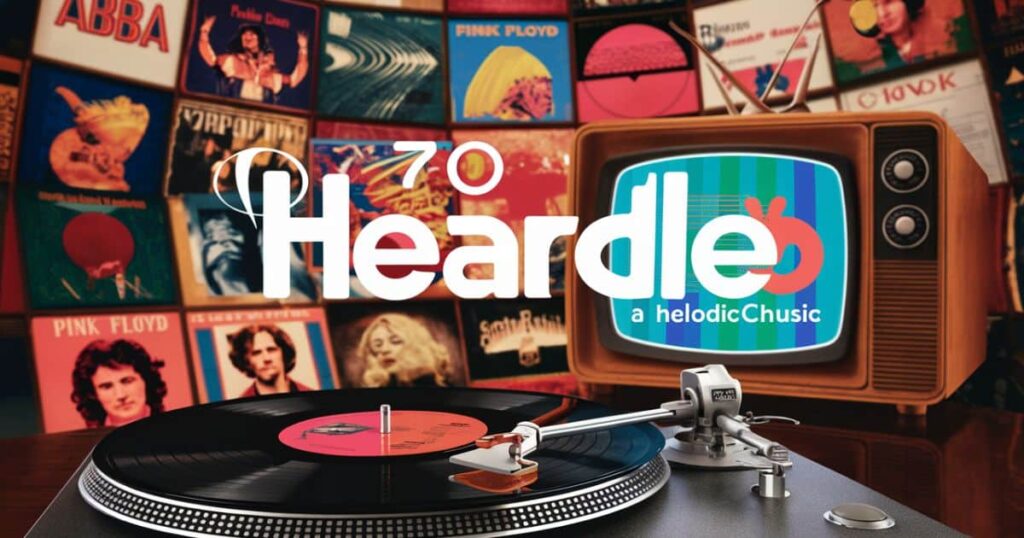It’s incredible how a few seconds of a familiar tune can instantly transport you back to a specific time and place. The opening chords of a classic rock anthem might whisk you back to your high school days, while the funky bassline of a disco hit could conjure memories of carefree nights on the dance floor. This is the magic of music nostalgia, and it’s precisely what makes the online game Heardle so addictive.
What is Heardle, and Why is it so Addictive?
Heardle is a simple yet ingenious game that tests your knowledge of popular songs from various eras. Each day, you’re presented with a short audio snippet, and your goal is to guess the song title and artist correctly. As the seconds tick by, the clip grows longer, providing more clues to help you identify the tune.
The game’s viral popularity can be attributed to its ability to tap into our love for music nostalgia. Guessing a song you haven’t heard in years is a thrilling experience, and the satisfaction of getting it right is unparalleled. Heardle has fostered a dedicated community of music enthusiasts who share their daily triumphs and frustrations online, making the experience even more enjoyable.
The 70s: A Decade of Musical Revolution
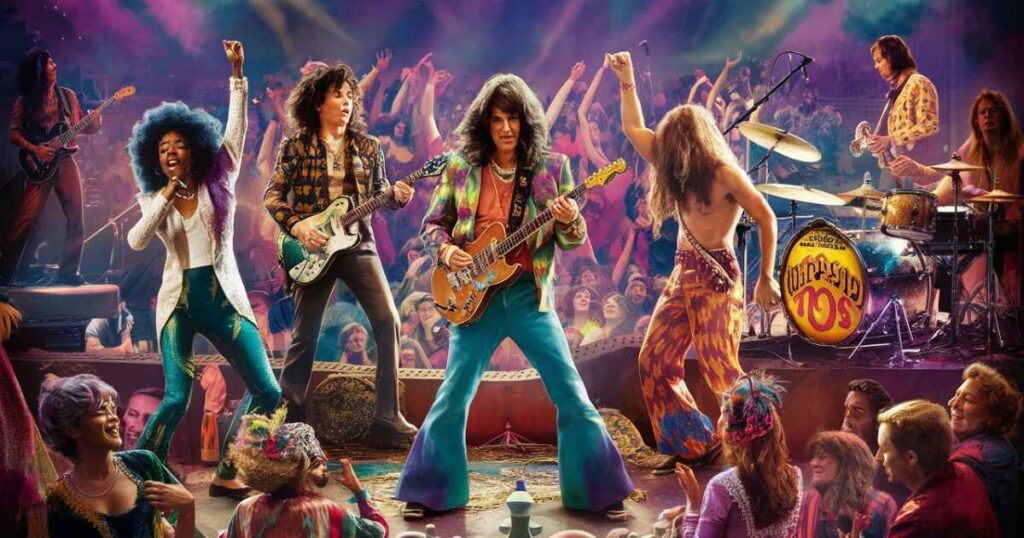
When it comes to nostalgic music, few decades can match the cultural significance and impact of the 1970s. This era witnessed a remarkable shift in the music landscape, with genres like rock, disco, punk, funk, and more taking center stage.
The 70s were a time of artistic expression and social change, and the music of the era reflected these cultural movements. Artists like David Bowie, with his groundbreaking albums like “The Rise and Fall of Ziggy Stardust and the Spiders from Mars,” pushed the boundaries of gender norms and challenged societal conventions. Meanwhile, bands like The Ramones and The Clash ushered in the punk rock revolution, giving voice to a disaffected youth with their raw, high-energy sound.
Not to be outdone, the disco fever swept the nation, with artists like Donna Summer, The Bee Gees, and Gloria Gaynor dominating the dance floors with their infectious beats and catchy hooks. And let’s not forget the enduring appeal of classic rock, with bands like Led Zeppelin, Pink Floyd, and Queen cementing their legendary status with iconic albums and unforgettable live performances.
| Genre | Notable Artists |
| Rock | Led Zeppelin, Pink Floyd, Queen, The Rolling Stones |
| Disco | Donna Summer, The Bee Gees, Gloria Gaynor, Chic |
| Punk | The Ramones, The Clash, Sex Pistols, The Damned |
| Funk | Parliament-Funkadelic, The Commodores, Earth, Wind & Fire |
Iconic Artists and Songs of the 70s
Speaking of iconic artists, the 70s were a treasure trove of musical gems. Who could forget the legendary John Lennon and Paul McCartney reuniting for their hit “Uncle Albert/Admiral Halsey”? Or the timeless ballad “Hotel California” by The Eagles, which remains a staple on classic rock radio stations to this day?
“We are the champions, my friends, and we’ll keep on fighting till the end.” – Queen, “We Are the Champions”
Let’s not forget the enduring legacy of ABBA, the Swedish pop sensation whose catchy melodies and memorable lyrics have transcended generations. From “Dancing Queen” to “Mamma Mia,” their songs have become anthems for celebrations and sing-alongs worldwide.
And who could resist the soulful vocals of Aretha Franklin, the undisputed Queen of Soul? Her empowering hit “Respect” became an anthem for the civil rights movement and a testament to her incredible talent.
Heardle 70s: A Nostalgic Challenge
While guessing contemporary hits on Heardle can be a fun challenge, there’s something extra special about identifying those iconic 70s tunes. The unique production styles, instrumentation, and vocal performances of that era make for a truly nostalgic experience.
Personally, I’ve found that the opening guitar riffs or keyboard lines are often the biggest giveaways for 70s rock and pop songs. Who could mistake the unmistakable intro to Queen’s “Bohemian Rhapsody” or The Knack’s “My Sharona”?
On the other hand, disco tracks can be trickier to guess, as they often rely on groovy basslines and rhythmic patterns. But once you catch the distinct funk or that pulsating beat, the song usually clicks into place.
Have you had any memorable Heardle 70s triumphs or frustrations? Share your experiences in the comments!
The Enduring Legacy of 70s Music
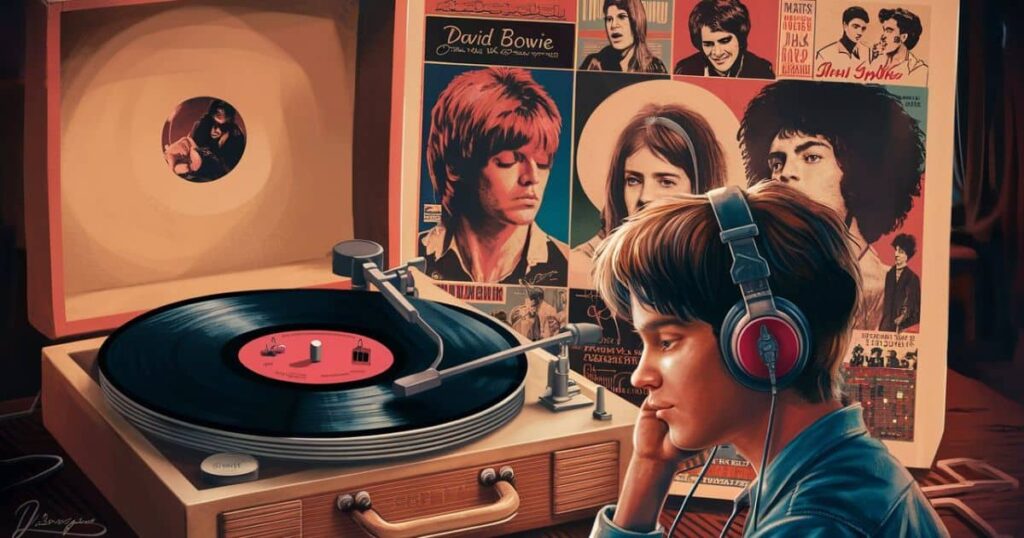
Despite the decades that have passed, the music of the 70s remains as vibrant and influential as ever. Contemporary artists across genres continue to draw inspiration from the sounds and styles of that era, keeping the legacy alive.
Just look at the resurgence of disco-influenced pop in recent years, with artists like Dua Lipa, The Weeknd, and Silk Sonic (the collaboration between Bruno Mars and Anderson .Paak) incorporating those funky grooves and infectious rhythms into their music.
Similarly, the raw energy and attitude of 70s punk rock can be heard in the work of modern rock bands like Green Day, Blink-182, and Fall Out Boy. And who could forget the enduring influence of Queen, whose operatic rock sound has inspired generations of artists, from Lady Gaga to Panic! At the Disco?
The timeless appeal of 70s music lies in its ability to evoke powerful emotions and memories. Whether it’s the nostalgia of a carefree youth or the excitement of discovering a new genre, these songs have the power to transport us to different times and places, making them truly special.
So, embrace the nostalgia, dust off those old vinyl records (or fire up your favorite streaming service), and rediscover the magic of the 70s through Heardle. Who knows, you might just find yourself singing along to “Bohemian Rhapsody” or busting out your best disco moves to “Night Fever” before you know it!
The Fashion and Style of the 70s
Music and fashion have always gone hand-in-hand, and the 70s were no exception. The decade’s iconic musical acts and their unique styles left an indelible mark on pop culture.
Who could forget the electrifying stage presence and gender-bending fashion of David Bowie, with his daring outfits and bold makeup? Or the sleek, glamorous look of ABBA, whose sparkling jumpsuits and platform boots became instantly recognizable?
Even the punk movement, spearheaded by bands like The Ramones and The Clash, had its own distinct fashion sensibilities. Ripped jeans, leather jackets, and safety pins adorned as accessories became the uniform for rebellion and anti-establishment attitudes.
The Disco Craze
Of course, no discussion of 70s fashion would be complete without mentioning the disco craze. As the pulsating beats of disco music took over dance floors, the fashion followed suit. Sequins, bell-bottoms, and platform shoes became the norm, as people embraced the flashy and flamboyant styles of the era.
Legendary acts like Donna Summer and The Bee Gees epitomized the disco look, with their sparkling ensembles and over-the-top hairstyles. It was a time when dressing up and letting loose on the dance floor was the ultimate form of self-expression.
The Impact of Music Videos
While music videos weren’t a new concept in the 70s, the decade saw a significant evolution in the art form. As television became more widespread, music videos began to play a crucial role in promoting and showcasing artists’ work.
One of the most iconic music videos of the era was Queen’s “Bohemian Rhapsody,” a groundbreaking visual masterpiece that showcased the band’s theatrical performance and Freddie Mercury’s unparalleled stage presence.
Another notable example was Michael Jackson’s “Billie Jean,” released in 1983 but heavily influenced by the 70s disco and funk sound. The video’s intricate choreography and cinematic visuals set a new standard for music videos, solidifying Michael Jackson’s status as the King of Pop.
These early music videos not only served as promotional tools but also allowed artists to create captivating narratives and visual representations of their songs, further enhancing the audience’s connection to the music.
The Resurgence of Vinyl
In recent years, there has been a remarkable resurgence of vinyl records, with music enthusiasts and collectors rediscovering the joys of physical media. And when it comes to revisiting the sounds of the 70s, few formats can match the warmth and nostalgia of a well-loved vinyl record.
Flipping through the album covers, carefully placing the needle on the spinning disc, and experiencing the rich, analog sound – it’s all part of the ritual that makes listening to 70s music on vinyl so special.
Many iconic albums from the era, such as Pink Floyd’s “The Dark Side of the Moon” and Led Zeppelin’s “Led Zeppelin IV,” have seen a resurgence in popularity among vinyl collectors, allowing new generations to appreciate the timeless music in its original format.
“There’s just something about the crackle and warmth of vinyl that digital formats can’t quite replicate,” says Jason, a avid record collector. “It’s like time-traveling back to the 70s with each spin of the record.”
Whether you’re a longtime vinyl enthusiast or a newcomer to the format, there’s no denying the nostalgic appeal of experiencing 70s music the way it was originally intended – on glorious, analog vinyl.
By incorporating these additional sections, the blog post can provide a more well-rounded and immersive exploration of the music, fashion, cultural impact, and enduring legacy of the 70s era.
Live Concerts and Music Festivals of the 70s
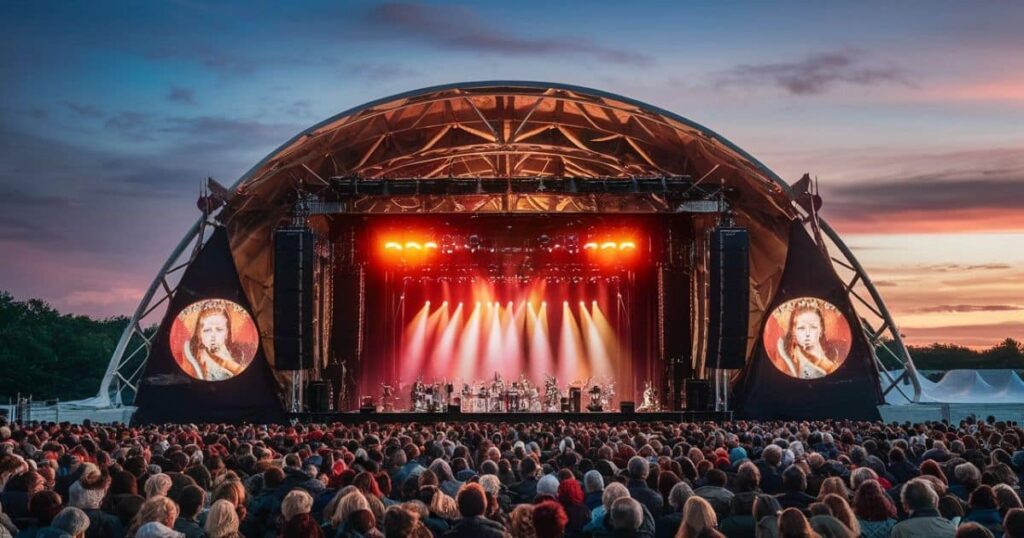
While we might associate large-scale music festivals with more modern times, the 70s saw some of the most iconic and influential live music events in history. These gatherings not only showcased the incredible talent of the era but also fostered a sense of community and cultural unity among music fans.
Woodstock (1969)
Although it took place in the late 60s, the Woodstock Music and Art Fair set the stage for the live music experience of the 70s. Held on a dairy farm in Bethel, New York, Woodstock was a defining moment in counterculture history, attracting over 400,000 attendees and featuring performances by legendary acts like Jimi Hendrix, Janis Joplin, The Who, and Joe Cocker.
Isle of Wight Festival (1970)
Just a year after Woodstock, the Isle of Wight Festival in England became one of the largest rock music events of its time. With an estimated attendance of over 600,000 people, the festival featured iconic performances by The Doors, The Who, Jimi Hendrix (in what would be his final UK appearance), and many more.
Glastonbury Festival
While it started as a modest gathering in 1970, the Glastonbury Festival quickly grew into one of the most renowned music festivals in the world. Throughout the 70s, the festival hosted a diverse range of acts, from David Bowie and Van Morrison to Fairport Convention and Traffic, solidifying its reputation as a hub for counterculture and artistic expression.
These massive live events not only showcased the incredible talents of the era but also fostered a sense of community and shared experience among music fans. The energy and camaraderie of these festivals have left an indelible mark on music history and continue to inspire modern-day music festivals worldwide.
Read This Post: Google Minesweeper: Rules, Strategies, And Tips
The Influence of 70s Music on Modern Pop Culture
The impact of 70s music can be felt far beyond the confines of the music industry. Its influence has permeated various aspects of popular culture, from fashion and art to movies and television.
Movies and TV Shows
Many popular movies and TV shows have paid homage to the music of the 70s or used it as a central theme. The Oscar-winning film “Almost Famous” (2000) provided a nostalgic look at the rock music scene of the 70s, while the hit TV series “Stranger Things” (2016-present) has become known for its brilliant use of 70s and 80s pop culture references, including iconic songs from the era.
Other notable examples include the cult classic “Dazed and Confused” (1993), set in the 70s and featuring a stellar soundtrack, and the Broadway musical “Rock of Ages” (2009), which celebrated the glitz and glamour of 70s rock.
Fashion and Style
As mentioned earlier, the fashion of the 70s was inextricably linked to the music of the time. However, the influence of 70s style has transcended the decade itself, with modern designers and fashion enthusiasts drawing inspiration from the era’s bold and eclectic looks.
From flared jeans and platform shoes to bold prints and statement accessories, elements of 70s fashion can be seen on runways and in street style across the globe. Even major fashion brands like Gucci and Saint Laurent have paid homage to the decade’s iconic styles in their collections.
Art and Pop Culture
The music of the 70s has also left an indelible mark on the art world, with countless artists and creatives drawing inspiration from the era’s sonic and visual aesthetics.
Pop art icons like Andy Warhol and Roy Lichtenstein often incorporated elements of 70s music culture into their work, while contemporary artists like Kehinde Wiley and Mickalene Thomas have explored themes of identity, representation, and social change through the lens of 70s music and fashion.
In short, the influence of 70s music extends far beyond the realms of music itself, serving as a cultural touchstone and source of inspiration for generations to come.
The Birth of Music Festivals and Legendary Concert Tours
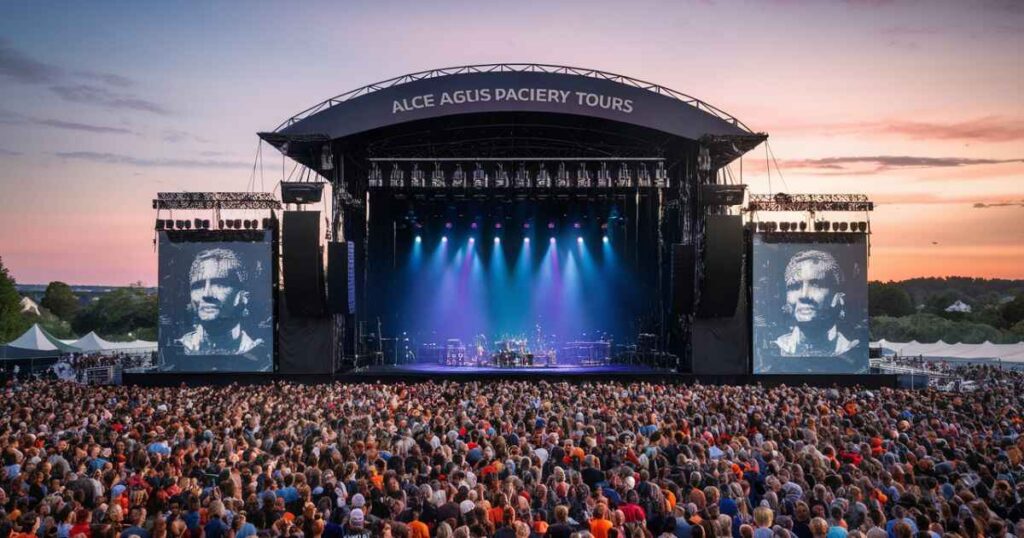
The 1970s witnessed the birth of large-scale music festivals and legendary concert tours that have left an indelible mark on the live music experience. These events brought together thousands, and sometimes millions, of fans, creating unforgettable shared experiences that continue to inspire modern-day festivals and tours.
Legendary Concert Tours
The 70s saw some of the most iconic and groundbreaking concert tours of all time. Led Zeppelin’s 1973 tour in support of their album “Houses of the Holy” was a massive undertaking, featuring an elaborate stage production and multiple nights in major cities. The tour set new records for attendance and ushered in a new era of large-scale rock spectacles.
Similarly, The Rolling Stones’ 1975 Tour of the Americas was a monumental event, spanning 48 shows across the United States and Canada. The tour’s incredible production values, featuring a massive stage setup and state-of-the-art sound and lighting systems, raised the bar for live performances and cemented the Stones’ status as one of the greatest live acts in history.
The Rise of Music Festivals
While music festivals had existed before the 70s, the decade saw a surge in popularity and scale for these events. The iconic Woodstock festival in 1969 set the stage for the rise of massive outdoor music gatherings, attracting hundreds of thousands of attendees and featuring some of the biggest names in rock and folk music.
Building on the success of Woodstock, festivals like the Isle of Wight Festival in 1970 and the Glastonbury Festival (which began in 1970) quickly became destinations for music fans seeking a communal experience and a celebration of counterculture.
These festivals not only provided a platform for legendary performances but also fostered a sense of community and shared experience among attendees. They became cultural touchstones, influencing everything from fashion to social movements, and paving the way for the modern-day festival scene.
The Emergence of Disco and Its Impact on Dance Culture
While rock and punk dominated the 70s music scene, the decade also witnessed the rise of disco, a genre that revolutionized dance culture and left an indelible mark on popular music.
Disco’s origins can be traced back to the underground clubs of New York City, where DJs like David Mancuso and Frankie Knuckles pioneered a new style of mixing and blending records to create a continuous, danceable groove. The infectious rhythms and pulsating beats of disco quickly caught on, with clubs like Studio 54 becoming epicenters of the disco craze.
Artists like Donna Summer, The Bee Gees, and Chic became the driving forces behind the disco movement, crafting hits like “MacArthur Park,” “Night Fever,” and “Le Freak” that dominated the airwaves and dance floors.
The impact of disco extended far beyond the music itself. It sparked a cultural revolution, with fashion, dance, and lifestyle trends all influenced by the disco ethos. Disco’s emphasis on self-expression, glamour, and escapism resonated with marginalized communities, particularly the LGBTQ+ community, who found solace and empowerment on the dance floor.
While disco’s popularity waned in the late 70s and early 80s, its influence can still be felt in modern dance music genres like house, techno, and EDM. The spirit of disco – the celebration of individuality, freedom, and the pure joy of movement – remains a powerful force in popular culture.

